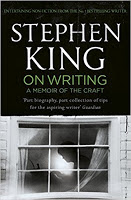When you have craft questions, where do you go for answers? A particular website? A book? Podcasts? Writer friends?
by Dietrich
I learned a good deal about craft from reading, reading and more reading. I read what I think is good, the kind of books that inspire my own writing. And maybe some of that resonates and becomes part of what works for me.
When I got started, I found out about showing and not telling; having hidden meaning under a character’s dialogue; using description sparingly to drive a story’s pace, learning when to slow it down and when to pick it up again. I learned to drop in plot twists a reader wouldn’t see coming from twenty pages away. And above all, I learned what to leave out on that important next draft. As I gained confidence, I felt I was starting to understand what I was doing. I took what I learned, sifted and whittled what worked and I just kept on writing. I guess I found a voice and a niche that worked for me, and I was having a blast writing the kind of books that I liked to read myself.
There are a couple of brilliant books I’ve mentioned before on the subject of craft: Stephen King’s On Writing: A Memoir of the Craft, and Elmore Leonard’s 10 Rules of Writing. Both are highly recommended.
There are courses on the subject too, and there are plenty of helpful authors, publishers, editors and agents who one might ask. Sometimes asking for criticism can be a bit of a crap shoot, depending on who one asks, and depending on the way their own tastes run. But, if a new writer finds it hard to be objective about their own writing, it could be a good way to go.
I try not to overthink things and I’ve come to trust my instincts. I don’t want chains and straps thrown over my imagination. It’s a creative process that requires good instincts, and when I feel it’s working then I go with that. And I’ve learned not to over edit and second guess my own work. When it’s done, then it’s time to pass it on. There’s always that safety net of publishers and a team of editors who will be giving it a hard look and likely catch anything I goofed up.
For me, there’s no substitute for just rolling up my sleeves and writing until something clicks. And when I can pick up what I wrote the day before and honestly say, “Hey, this isn’t total crap.” Then I know I’m on the right track and getting somewhere.



7 comments:
I think you're right, Dietrich, about reading and more reading. It's good to see how others do it. It's also good, as you say, not to overthink. I think some people get stopped by that and don't move forward. But it's by trial and error that we really learn, imo.
You've got a practical approach to writing that works - keep learning, keep writing, and trust the editorial process. Good post, Dietrich.
Thanks Paul and Brenda.
I'm so glad this isn't my week. because I'd be saying "Ditto, ditto, ditto" and that's not a blogpost. I love finding a brilliant twist in a book I'm reading and going back to see how it was done. Angie Kim's MIRACLE CREEK (just finished) worried me because I thought there was no way for her to get a character out of the corner. How wrong I was!
Thanks for the comment, Catriona. And I think I better take a look at Miracle Creek.
Your post really shows how a good writer can learn to trust his or her own processes, at the same time being open to learning more. Really good indirect advice, Dietrich.
Thanks, Susan.
Post a Comment